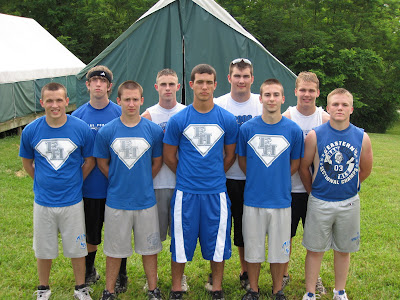Church on the Ball from CatholicStudio on Vimeo.
The World Cup Starts Today. I thought some general information would help.
This is the 19th World Cup. The first was in Uruguay in 1930. Since then only 7 Countries have won the Cup. 9 victories from Europe and 9 from South America.
Brazil 5 (1958, 1962, 1970, 1994, 2002)
Italy 4 (1934*, 1938, 1982, 2006)
Germany 3 (1954, 1974*, 1990)
Argentina 2 (1978*, 1986)
Uruguay 2 (1930*, 1950)
France 1 (1998*)
England 1 (1966*)
Italy 4 (1934*, 1938, 1982, 2006)
Germany 3 (1954, 1974*, 1990)
Argentina 2 (1978*, 1986)
Uruguay 2 (1930*, 1950)
France 1 (1998*)
England 1 (1966*)
List of qualified teams
The following 32 teams qualified for the final tournament.
The following 32 teams qualified for the final tournament.
FAR EAST (5)
- Australia
- Japan
- Korea DPR
- Korea Republic
- New Zealand
- Algeria
- Cameroon
- Côte d'Ivoire
- Ghana
- Nigeria
- South Africa (hosts)
NORTH AND CENTRAL AMERICA (3)
- Honduras
- Mexico
- United States
- Argentina
- Brazil
- Chile
- Paraguay
- Uruguay
- Denmark
- England
- France
- Germany
- Greece
- Italy
- Netherlands
- Portugal
- Serbia
- Slovakia
- Slovenia
- Spain
- Switzerland
Host Nation South Africa
This is the first time the continent of Africa has hosted the World Cup.
The Republic of South Africa is a country located at the southern tip of Africa.
Lesotho is an independent country wholly surrounded by South African territory.
South Africa is ethnically diverse. About 79.5% of the South African population is of black African ancestry. There are 11 official languages recognised in the constitution.It also contains the largest European, Indian, and racially mixed communities in Africa.
25% of the population is unemployed and lives on less than US $1.25 a day. (This equals about 12,500,000 people, approximately the population of Pennsylvania)
Population: 49,320,000 (approximately California and Ohio put together)
Size: 471,000 square miles (approximately the size of Texas, New Mexico and Arizona put together)
The month-long finals are actually the climax of a three-year competition which began in August 2007 when New Caledonia beat Tahiti 1-0. More than 200 FIFA member states -- it's an organization with more members than the United Nations -- have taken part, playing more than 850 qualifying matches.
The World Cup final is the closest thing the planet has to a collective viewing experience. Hundreds of millions will watch the final on July 11, while world governing body FIFA predicts a cumulative audience for the tournament of 26.29 billion viewers.
26.29 billion total viewers - interesting - knowing that the world population has less than 7 billion people.
As of 10 June 2010, the human population of the world is estimated by the United States Census Bureau to be 6,826,300,000.
Soccer World Cup prayer
Almighty God,
creator of all, as people from
every nation gather with excitement
and enthusiasm for the 2010 World Soccer
Cup may South Africans be good hosts, our
visitors welcomed guests and the players from
every team be blessed with good sportsmanship
and health. May your Spirit of fairness, justice and
peace prevail amongst players and all involved. May
each contribute in his own positive ways to prevent,
control and fight crime and corruption, hooliganism of
any kind and exploitation and abuse, especially of
those most vulnerable. May those far away from
home and those in their families find much joy
in this occasion to celebrate the beautiful
game of soccer and the beautiful
game of life according to Your
plan for the common good
of all. Amen
Almighty God,
creator of all, as people from
every nation gather with excitement
and enthusiasm for the 2010 World Soccer
Cup may South Africans be good hosts, our
visitors welcomed guests and the players from
every team be blessed with good sportsmanship
and health. May your Spirit of fairness, justice and
peace prevail amongst players and all involved. May
each contribute in his own positive ways to prevent,
control and fight crime and corruption, hooliganism of
any kind and exploitation and abuse, especially of
those most vulnerable. May those far away from
home and those in their families find much joy
in this occasion to celebrate the beautiful
game of soccer and the beautiful
game of life according to Your
plan for the common good
of all. Amen









